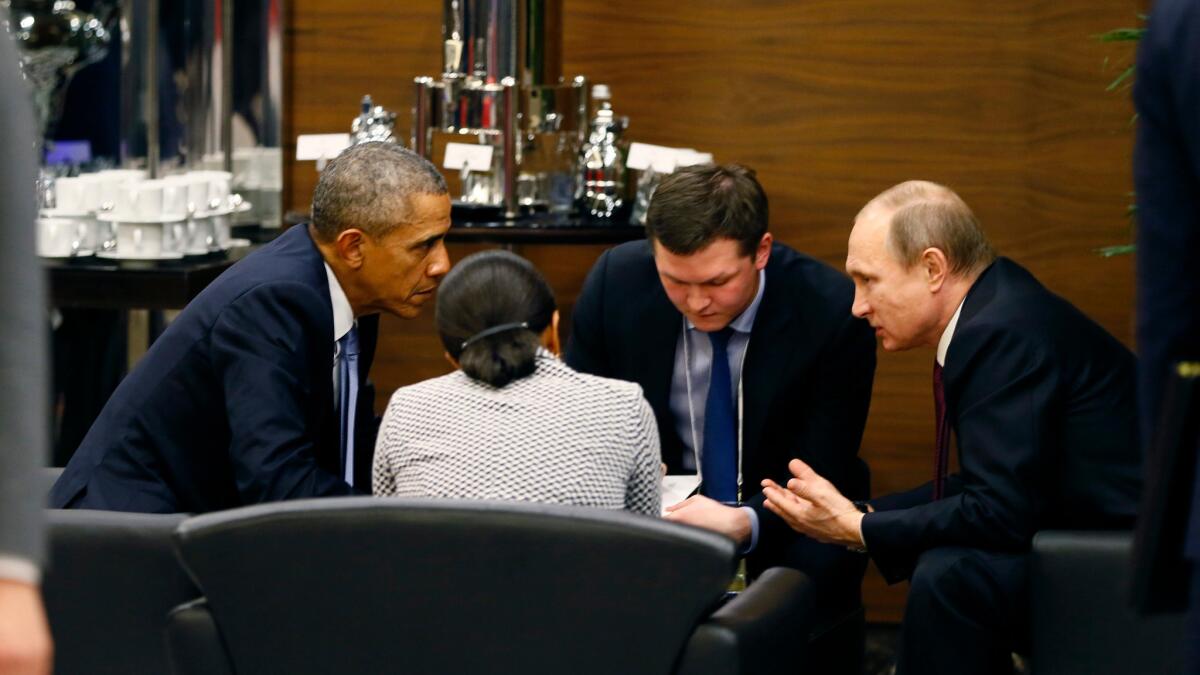Editorial: It may be a long shot, but trying to cooperate with Russia in Syria is Obama’s best option

- Share via
It’s easy to be skeptical about the Obama administration’s latest effort to bring an end to the civil war in Syria – a proposal that the U.S. and Russia coordinate their military operations in that country.
After all, the supposed united front between Washington and Moscow has repeatedly collapsed. Moscow has seemed more interested in propping up its client, President Bashar Assad, than in pressing for the political transition it has supported at the United Nations.
Frustrating as it may be, exploring the possibility of cooperation with Moscow in Syria is still preferable to ... U.S. military action.
But long shot or not, renewed cooperation between the U.S. and Russia is more likely to produce a negotiated end to the fighting than the alternative proposed by President Obama’s critics: U.S. military action against Assad. The latter proposal was offered last month by 51 State Department staffers who publicly dissented from administration policy, advocating that the U.S. attack Syrian forces with “stand-off weapons” such as remotely launched cruise missiles.
Not only would such attacks ratchet up U.S. military involvement in Syria, which so far has focused on Islamic State and similar groups, not the Assad regime, but they could lead to a confrontation with Russian forces. The same problem would arise if, as some suggest, the U.S. attempted to establish a “no-fly” zone in Syria.
On Wednesday, the Kremlin announced that President Vladimir Putin had called Obama to discuss the situation in Syria and the need for better “coordination” between the two countries. That announcement followed the declaration by the Syrian military of a unilateral three-day cease-fire timed to coincide with festivities marking the end of the Muslim holy month of Ramadan. Secretary of State John F. Kerry announced that the U.S. would seek to extend this latest cessation of hostilities.
Late last month, the Obama administration proposed that the U.S. and Russia join in an expanded air campaign against Al Nusra Front, Al Qaeda’s Syrian branch. As part of the arrangement, Russia would desist from attacking opposition groups recognized by the U.S. If Putin is receptive to the U.S. proposal, it could lead to a broader cooperation between the two countries in pressing for the “political transition” in Syria called for in a series of U.N. Security Council resolutions.
Five years ago, Obama stated that it was time for Assad to step down. But U.S. efforts to dislodge the brutal leader through support of “moderate” opposition groups have been an embarrassing failure. The administration now seems to recognize that stopping the fighting in Syria (where 300,000 people have died since 2011) and defeating Islamic State and Al Nusra Front are more immediate priorities than ousting Assad – though it continues to argue that he eventually should step down.
Frustrating as it may be, exploring the possibility of cooperation with Moscow in Syria is still preferable to trying to oust Assad through U.S. military action.
Follow the Opinion section on Twitter @latimesopinion or Facebook
More to Read
A cure for the common opinion
Get thought-provoking perspectives with our weekly newsletter.
You may occasionally receive promotional content from the Los Angeles Times.









